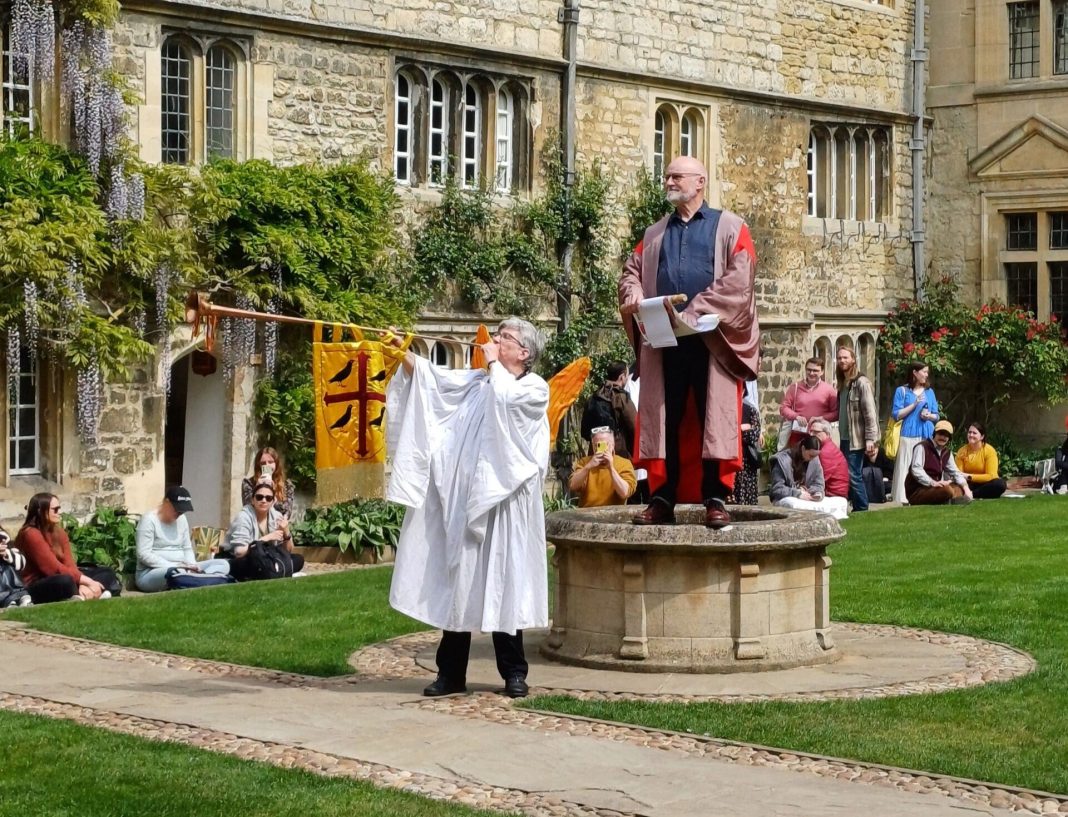I wasn’t sure what to expect from a Medieval mystery play cycle. What I was not anticipating was Lucifer recast as a finance bro ‘fired’ from Heaven (now a corporate office setting), shepherds from the Nativity prancing through a graveyard while singing in 16th-century French, and a comedy about four incompetent soldiers and the crucifixion of Christ. Oh, and Lucifer was howling in Middle English.
These surreal and wonderful plays were performed in a mixture of languages including contemporary and Middle English, Medieval German, and even Middle Dutch across 13 short shows. It was all set against the backdrop of St Edmund Hall’s medieval architecture, offering a brief but tantalising window into the world of medieval theatre.
Perhaps what took me most off guard was just how funny it was. Jim Harris, the effortless dead-pan deliverer of one-liners in rhyme, remarked in his introduction (preceded by an actual trumpet fanfare): “You’re going to be here for hours”. Yet this elicited not groans but laughter. There was a sense of festivity in the air from the very beginning. Talking to Cherwell, the Heads of Performance, Antonia Anstatt and Sarah Ware, said this is what they were hoping for. “The levity [of these shows] is an important thing, especially if you’re sitting in a marathon” of plays, said Sarah. Antonia also mentioned that the Play Cycle immediately dispels the myth we have of “the Middle Ages as a period when people took everything really seriously.” Instead, she said we “have actually really funny plays about women being martyred or [about] the crucifixion … it gives us a new idea of the Middle Ages, and how they approached these biblical texts. And like Sarah said… they also wanted to have fun … on these carnival-like days.” Indeed, Sarah herself had remarked how “medieval mystery plays were very much the everyday person’s most easy access to the world of biblical narrative. These [plays] were how people accessed the Bible – in addition to attending church, if they could.”
One highlight was the charged rendition of The Martyrdom of the Three Holy Virgins, done in a blend of Latin and Present-Day English that flowed relatively seamlessly into one another. It featured the brutal martyrdoms of three women who refused arranged marriage and pagan customs. The Latin was performed with vigour, declared in distinctly Italian tones that, while perhaps not historically accurate, were nonetheless suitably emotive for the narrative. There were impassioned performances from all of the martyrs – Loveday Liu, Abigail Pole, and Laura Laubeas. Liu was especially striking, defiantly staring down the figure of Emperor Diocletian (Jialin Li) as she decried her unwanted wedding. The aesthetic was partly modernised, the ‘guards’ becoming fascistic police officers that dragged the martyrs offstage in a way hauntingly reminiscent of the arrests of contemporary protesters.
Perhaps the strangest play was The York Crucifixion, translated into Modern English but retaining its original Middle English rhythms. The crucifixion is hardly an event I’d consider ripe comedic material, let alone in a medieval context. Nonetheless, the absurdity was heightened in this modern interpretation. From nailing Christ to the Cross with inflatable hammers, to saying Jesus had saved them time when “he himself laid him down”, these Three (in this case four) Stooge-esque soldiers are almost endearing in characterisation, until you remember they are condemning Jesus to an agonising death. The physical comedy juxtaposed to Jesus’ stoic proclamations is another reminder of the bleak sense of humour that was more normalised in medieval theatre than one would typically imagine.
The most amusing play, though, was the final one in the rotation, The Last Judgement – labelled “good old-fashioned eschatological fun” in the extended programme. It certainly fulfils its promise. The Angel Gabe (Alice Watkinson), a guitar-wielding herald of the end of the days, chirpily introduces the play with “Wow! Judgement Day! You guys excited?”. Indeed, though adapted by Ruby Whitehouse from the Middle English The Last Judgement, the play has more in common with the irreverence of Terry Pratchett and Neil Gaiman’s Good Omens than the doom, fire, and brimstone of the Book of Revelations. At one point, a jubilant and smarmy Jesus (Alicia Camacho Fielding) skips airily about with those souls destined for heaven, while the others are dragged off to hell by a leather-jacketed Satan. Naturally, Satan, played by Daniel Pereira, is accompanied by his very own hype squad. Who knew the end of the world could be so much fun?
The days of free Medieval Mystery performances stretching across an entire city centre may have faded. But in a large audience including students, faculty, Oxford residents, and others besides, we all were united in this brief resurrection of lost ages and medieval worlds. Before us, the medieval and the modern were fused, as dead tongues were brought back to life.


